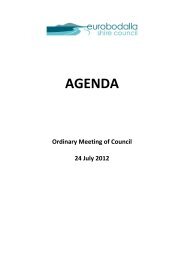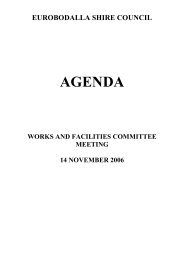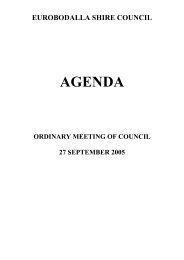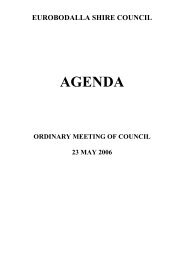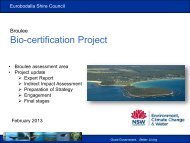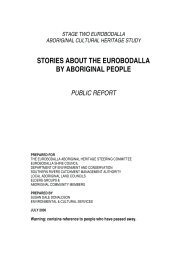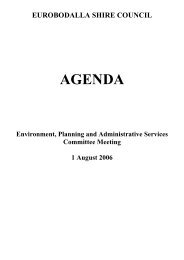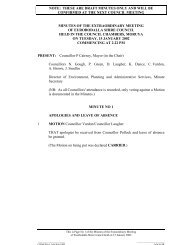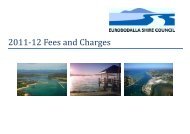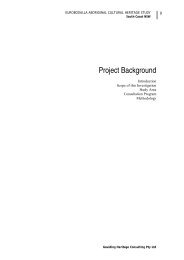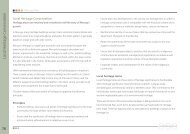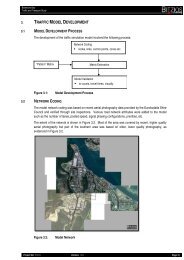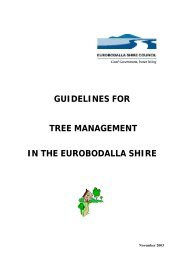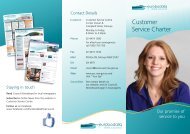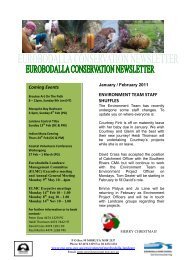Eurobodalla Integrated Water Cycle Management Strategy
Eurobodalla Integrated Water Cycle Management Strategy
Eurobodalla Integrated Water Cycle Management Strategy
You also want an ePaper? Increase the reach of your titles
YUMPU automatically turns print PDFs into web optimized ePapers that Google loves.
FACT SHEET 4<br />
Effluent Reuse<br />
What is Effluent Reuse?<br />
<strong>Eurobodalla</strong> <strong>Integrated</strong> <strong>Water</strong> <strong>Cycle</strong> <strong>Management</strong> <strong>Strategy</strong><br />
Effluent reuse involves the utilisation of suitably treated wastewater for beneficial uses. It<br />
represents a significant move away from the traditional notion of effluent being considered only<br />
as a waste product, which is conventionally disposed of through ocean or waterway discharge.<br />
<strong>Water</strong> from sewage treatment plants can be treated to a standard suitable for a range of<br />
applications including industrial reuse, agricultural reuse, non potable domestic reuse, urban<br />
open space reuse and indirect potable reuse (the level to which water must be treated for<br />
different end uses is described in Appendix D).<br />
Site-specific analysis is required to assess the balances of water, nutrients, organics and<br />
soluble salts to identify the most cost-effective and sustainable options for on-land disposal of<br />
wastewater. Ongoing monitoring is important to ensure sustainability.<br />
Examples<br />
The REMS (reclaimed effluent management scheme)<br />
project in the Shoalhaven is an extensive irrigation scheme<br />
utilising wastewater from the region. The irrigation scheme<br />
comprises 14 dairy farms, a golf course and sporting fields.<br />
<strong>Water</strong> is delivered at a constant rate into balancing ponds<br />
on user’s land (see picture right) (www.shoalhaven.nsw.gov.au).<br />
Benefits<br />
Reclaimed water, used in place of fresh water, reduces the pressure on treated water for nonpotable<br />
uses (e.g. open area irrigation) and provides a drought proof irrigation water supply.<br />
Effluent reuse assists in the preservation of fresh water supplies as well as reduces the need<br />
to use commercial fertilisers on crops and pastures. Treated effluent contains water, plant<br />
nutrients and organic matter, which together can improve soil fertility and encourage plant<br />
growth.<br />
Effluent reuse can provide regeneration of deteriorated habitats (wetlands).<br />
Reduces the impact of wastewater discharges on waterways, and enhances resource recycling<br />
with water returned at an earlier stage of the water cycle for recycling.<br />
Promotes awareness of water conservation issues through practice.<br />
Assists in meeting legislative and regulatory compliance, and license conditions (e.g. loadbased<br />
licensing).<br />
The use of reclaimed water can have economic benefits, depending on connection fees and<br />
charge per volume, and can reduce the costs of fertilisers. (Suitable studies are necessary to<br />
prevent costly soil structure problems caused by too many nutrients).<br />
19



